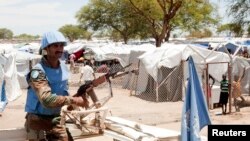The United States on Monday announced nearly $83 million in additional emergency assistance for South Sudan.
The new pledge brings to more than $720 million the total U.S. emergency assistance for South Sudan in fiscal year 2014, which ends on Tuesday.
The new funds will be used to help South Sudanese who are living as refugees in neighboring countries or are internally displaced inside South Sudan, a statement released by the State Department said.
"With over 450,000 new South Sudanese refugees since December 2013, there are now more refugees than when the Comprehensive Peace Agreement ended Sudan’s long civil war in 2005," the statement said.
"An additional 200,000 South Sudanese are expected to flee to neighboring countries by the end of the year," the statement said.
There are now more refugees than when the Comprehensive Peace Agreement ended Sudan’s long civil war in 2005.U.S. State Department on South Sudan
The new pledge of funding was announced by Assistant Secretary of State Anne Richard at a meeting of the U.N. High Commissioner for Refugees' executive council in Geneva.
Although there has been a lull in the fighting in South Sudan in recent days, the United States warned that "without progress on political negotiations, the end of the current rainy season is likely to bring a new, intensified chapter of fighting and displacement."
The United States called in its statement for "all parties to the conflict to end the violence and allow immediate and unconditional access for humanitarian workers to reach people in need across all areas of South Sudan."
A report released last week showed that the number of people at "crisis" and "emergency" levels of hunger in South Sudan -- phases three and four on a five-point scale – has dropped to 1.5 million from 3.9 million, thanks to the onset of the rainy season and a massive international aid effort.
But South Sudanese government officials and aid agencies warned that if the fighting continues, food security will be weakened again and more than 2.5 million people could face alarming levels of hunger at the beginning of next year.




